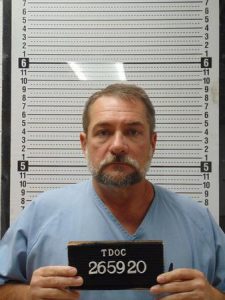March 15, 2022
By: Dwayne Page
A 54-year-old DeKalb County man serving a life sentence for first degree murder in the kidnapping and brutal killing of two men in 1995 will be up for parole next month.
The hearing for James Christopher Tatrow, convicted in the murders of John Harry and Roger Zammit, will be held at the Northwest Correctional Complex (NWCX) in Lake County at Tiptonville, Tennessee where Tatrow is incarcerated. Tatrow has spent half of his life behind bars because of the crimes.
This will be Tatrow’s second appearance before members of the Tennessee Board of Parole.
“At Tatrow’s initial parole hearing on Oct. 3, 2019, the Board voted to decline parole at the time and recommended a review hearing to be scheduled in April 2022. In Mr. Tatrow’s particular case, there needs to be four concurring votes by the Board members to reach a final decision,” said Dustin Krugel, Communications Director for the Tennessee Board of Parole.
(Click the link below to read details about the Chris Tatrow case in this 1998 Tennessee Court of Criminal Appeals ruling)
The story centers around Tatrow, who was a rodeo cowboy, college student and family man until he started abusing drugs after a serious back injury.
In January 1995 Tatrow’s trailer home in the Belk Community of DeKalb County became a hangout house where friends and acquaintances of Tatrow came and went.
The beginning of the nightmare was when Tatrow returned home from a trip to Texas to find that his trailer had been robbed. Prize belt buckles won in rodeos, a Navajo blanket that belonged to a close friend, an antique knife collection, a coin purse inherited from his great-grandfather, a toolbox and several guns were reported stolen to the sheriff’s department but having heard rumors that Roger Zammit and John Harry were responsible for the theft, Tatrow allegedly decided to take matters into his own hands. Along with several accomplices, Tatrow kidnapped Harry and Zammit and brought them to his home where they were tortured and beaten for several days before being murdered. According to court documents, Zammit, gored and bloody, along with Harry, was made to kneel in a bathtub. A plastic bag was placed around Zammit’s head and a cord around his neck. Tatrow, the former Rodeo star, had his knee in Zammit’s back and yanked the cord, and then took a heavy-duty flashlight and mercilessly beat him. After Zammit died, Harry was marched outside where he was shot in the head and died. Tatrow and his accomplices then wrapped the bodies of Zammit and Harry in carpet and woven wire fencing and took them to Hurricane Bridge on Cookeville Highway where they were dumped from the bridge in the lake.
After Zammit and Harry were reported missing an investigation led to the discovery of the bodies and the arrest of Tatrow and his accomplices. Because of the pre-trial publicity, the trial court ordered that the case against Tatrow be tried in Cumberland County rather than DeKalb County. Other co-defendants in the case were sentenced after the Tatrow trial. While Tatrow admitted that he was involved in the kidnappings and that he killed the victims, he contended that because he was suffering from a drug-induced psychosis, he was unable to formulate the requisite knowledge of wrongdoing at the time the crimes occurred. The state argued that voluntary intoxication could not be used to negate the element of recklessness and that the evidence in the record demonstrated beyond a reasonable doubt that Tatrow knowingly kidnapped and then recklessly murdered the victims.
At the conclusion of the two-week trial in 1996, the jury convicted Tatrow of two counts of felony murder and two counts of especially aggravated kidnapping in the deaths of Zammit and Harry. Tatrow was also convicted of two counts of premeditated and deliberate murder of the same victims, but the trial court set aside those verdicts as the thirteenth juror. In the sentencing phase, the jury declined to impose the death penalty or life without parole and sentenced Tatrow to serve life sentences with the possibility of parole. At the conclusion of a sentencing hearing, the trial court judge ordered Tatrow to serve two consecutive life sentences concurrently with sentences of 22 years for the kidnapping convictions. Tatrow later challenged the validity of the convictions and the propriety of consecutive sentencing.
Upon a review of the record and the law, The Tennessee Court of Criminal Appeals in 1998 affirmed Tatrow’s convictions but vacated the order to run the two life sentences consecutively.




